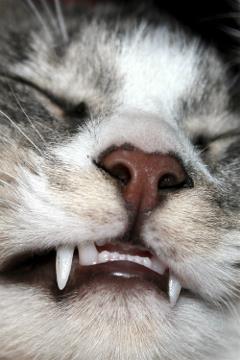Retained Baby Teeth Can Cause Big Problems

During their lifetime, dogs and cats will have two sets of teeth, the deciduous or baby teeth and the permanent or adult teeth. The deciduous teeth are the first to erupt, and are considered to be temporary since they are gradually replaced as the permanent teeth begin to work their way through the gum and into their proper position. Sometimes, when an animal is undergoing a dental examination, two sets of teeth may be observed. Such cases are indicative of an animal that has retained its deciduous teeth.
Normal Tooth Growth Pattern in Cats and Dogs
Typically born without teeth, the approximate age of a kitten or a puppy is easy to determine by observing the emergence of their deciduous teeth. For example:
- At some point around two to three weeks of age, the incisors which are the first of their deciduous teeth, erupt
- After the incisors, the canines push through, which are then followed by the animal’s premolars
- In kittens, the last premolar erupts by the time they reach 6 weeks of age
- This process takes longer in puppies, occurring near the time when the animal is about 8 to 12 weeks old
- Around 3 months of age, the permanent teeth of both kittens and puppies begin to replace the deciduous teeth
- As they near 7 to 8 months of age, their permanent teeth are fully in place
Retained Deciduous Teeth
As the permanent teeth start to emerge, the roots of the deciduous teeth will begin to be reabsorbed. If the roots fail to reabsorb, the animal will retain its deciduous teeth, giving it the look of a double set of teeth.
Clients with puppies and kittens need to be advised to check their pet’s teeth while watching for:
- Gradual loosening and loss of a deciduous tooth
- Emergence of a permanent tooth
- Double set of teeth, indicating retained deciduous teeth
If retained teeth are found, clients should be informed to bring their animals in for a dental examination.
Potential Problems
Retained deciduous teeth have the potential to cause extensive damage to an animal. Types of problems include, for example:
- Malocclusion and incorrect bite produced when a permanent tooth is pushed out of alignment, and which can cause:
- Teeth to rub against other teeth
- Wearing away of the enamel which will weaken a tooth
- Dental interlock which will obstruct the normal development and growth of the jaw bone
- Forcing permanent teeth into contact with palate creating severe pain and potential damage to the palate, as well as difficulty in eating
- Reduction of space for the permanent tooth to rest
- Collapse of space between the permanent and deciduous tooth
- Discoloration of tooth
- Fractured tooth
- Tooth crowding resulting in:
- Trapped food between teeth
- Tartar deposits
- Tooth decay
- Gingivitis
- Periodontitis
- Premature loss of teeth
- Roots that are not properly resorbed can become badly infected resulting in:
- Abscess
- Pain
- Infection
- Loss of tooth
Extraction
Extraction is advised in situations involving retained deciduous teeth. When diagnosis and treatment is performed early, the chance is greater that the animal’s permanent tooth will move into its proper position. Otherwise, there is a decreased likelihood that the tooth of the animal will ever be able to move into its position without orthodontic treatment.
The occurrence of retained deciduous teeth is common in cats and dogs. As with many dental problems, the earlier the diagnosis, the better the outcome. Educating clients of the value in establishing regular tooth brushing habits and maintaining routine dental examinations continues to be important.
To discuss retained deciduous teeth and other dental issues affecting cats and dogs in more detail, please contact your Covetrus representative at 855.724.3461.
Sources:
http://www.vcahospitals.com/main/pet-health-information/article/animal-health/retained-deciduous-teeth-baby-teeth-in-dogs/2248
http://www.veterinarydentalcenter.com/retained.htm


Working Here
Our team members are encouraged to be the best they can be... at Covetrus we believe we impact one another.
Learn MoreNews & Events
FDA Cautions Pet Owners Not to Feed Texas Tripe Inc. Raw Pet Food Due to Salmonella, Listeria Monocytogenes
The U.S. Food and Drug Administration is cautioning pet owners not to feed their pets any of the Texas Tripe brand raw frozen pet food listed below because several samples of Texas Tripe raw pet food have tested positive for Salmonella and/or L. mono.
Careers
Are you looking for a place to let your talents shine? At Covetrus, we help our practitioner customers better serve their patients and take pride in providing the best customer experience possible. Search our open positions to see our available opportunities.
Newsletter
Stay current with what’s going on with Covetrus, subscribe to receive our newsletter and email communications. Subscribers will receive the latest information in practice management, sales and marketing, animal health, and more.



-3-(1).png?sfvrsn=2d806d73_0)

Leave a comment